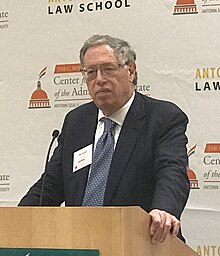
Back ريتشارد إبستاين Arabic ريتشارد ابستاين ARZ Ричард Алън Ъпстейн Bulgarian Richard Allen Epstein German Richard Epstein Spanish Richard Epstein ID リチャード・エプステイン Japanese
Richard Epstein | |
|---|---|
 Epstein in 2018 | |
| Born | April 17, 1943 New York City, U.S. |
| Spouse | Eileen |
| Children | 3 |
| Relatives | Paul Reiser (cousin) |
| Awards | Bradley Prize (2011) |
| Academic background | |
| Education | Columbia University (BA) Oriel College, Oxford (BA) Yale University (LLB) |
| Influences | |
| Academic work | |
| Discipline | Constitutional law Property law |
| Institutions | University of Southern California University of Chicago MacLean Center for Clinical Medical Ethics New York University |
| Main interests | Takings clause, Roman law |
| Notable works | Takings: Private Property and the Power of Eminent Domain (1985) |
| Influenced | Randy Barnett |
| This article is part of a series on |
| Libertarianism in the United States |
|---|
 |
Richard Allen Epstein (born April 17, 1943) is an American legal scholar known for his writings on torts, contracts, property rights, law and economics, classical liberalism, and libertarianism. He is the Laurence A. Tisch Professor of Law at New York University and the director of the Classical Liberal Institute. He also serves as the Peter and Kirsten Bedford Senior Fellow at the Hoover Institution and as a senior lecturer and the James Parker Hall Distinguished Service Professor of Law Emeritus at the University of Chicago.[1]
According to James W. Ely Jr., Epstein's writings have had a "pervasive influence on American legal thought."[2] In 2000, a study published in The Journal of Legal Studies identified Epstein as the 12th-most cited legal scholar of the 20th century; in 2008, he was chosen in a poll by Legal Affairs as one of the most influential modern legal thinkers. A study of legal publications between 2009 and 2013 found Epstein to be the third-most frequently cited American legal scholar during that period, behind only Cass Sunstein and Erwin Chemerinsky. In a 2021 examination by Fred R. Shapiro, Epstein was the fifth most-cited legal scholar of all time.[3]
- ^ "Richard Epstein - Biography | NYU School of Law". its.law.nyu.edu. Retrieved June 19, 2024.
- ^ Ely (2006), p. 421.
- ^ Shapiro, Fred (November 1, 2021). "The Most-Cited Legal Scholars Revisited". University of Chicago Law Review. 88 (7). ISSN 0041-9494.